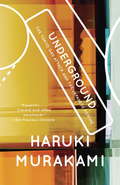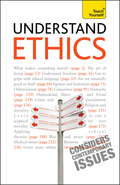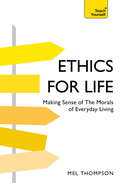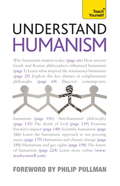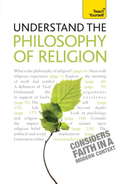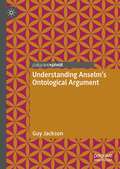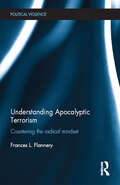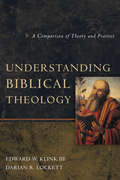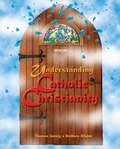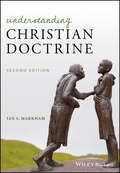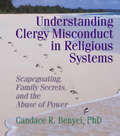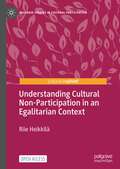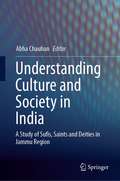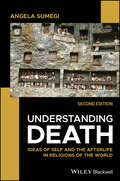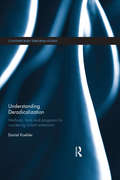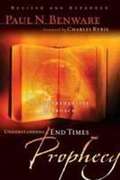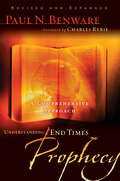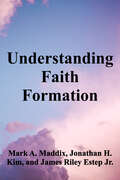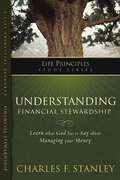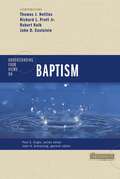- Table View
- List View
Underground Saints (The Communist Persecution of Christians)
by Richard WurmbrandMr. Wurmbrand uses actual Communist documents to describe the Christian's treatment in these countries.
Underground: The Tokyo Gas Attack and the Japanese Psyche (Vintage International)
by Haruki MurakamiIn this haunting work of journalistic investigation, Haruki Murakami tells the story of the horrific terrorist attack on Japanese soil that shook the entire world. On a clear spring day in 1995, five members of a religious cult unleashed poison gas on the Tokyo subway system. In attempt to discover why, Haruki Murakmi talks to the people who lived through the catastrophe, and in so doing lays bare the Japanese psyche. As he discerns the fundamental issues that led to the attack, Murakami paints a clear vision of an event that could occur anytime, anywhere.
Understand Ethics: Making Sense of the Morals of Everyday Living
by Mel ThompsonWhether you're a student studying philosophy at any level, or simply want to gain a deeper understanding of this fascinating subject, Understand Ethics is an accessible introduction to all the key theories and thinkers. Fully updated, this latest edition includes contemporary examples and discussion of current debates including terrorism, genetics and the media, helping you to grasp how ethics applies to life today.NOT GOT MUCH TIME?One, five and ten-minute introductions to key principles to get you started.AUTHOR INSIGHTSLots of instant help with common problems and quick tips for success, based on the author's many years of experience.TEST YOURSELFTests in the book and online to keep track of your progress.EXTEND YOUR KNOWLEDGEExtra online articles at www.teachyourself.com to give you a richer understanding of psychology.FIVE THINGS TO REMEMBERQuick refreshers to help you remember the key facts.TRY THISInnovative exercises illustrate what you've learnt and how to use it.
Understand Ethics: Making Sense of the Morals of Everyday Living (Teach Yourself General Ser.)
by Mel ThompsonWe all face questions on an almost daily basis related to truth and post-truth, particularly in the political sphere, terrorism, globalization, immigration and asylum, social responsibility, media and social-media ethics, and gender and LGBT issues. So how do you navigate this minefield? Ethics for Life is an accessible introduction to all the key theories and thinkers. It shows the relevance of ethical ideas and theories to everyday life, emphasizing the way our view of ourselves and the societies we live in is shaped by our moral values and the arguments they are based on.With contemporary examples and discussion of current debates including terrorism, genetics and the media, Ethics for Life will help you grasp how ethics applies to life today.
Understand Humanism: Teach Yourself (Teach Yourself General Ser.)
by Mark VernonUnderstand Humanism is the definitive introduction to this diverse and increasingly prominent philosophy. This guide teaches you everything you need to know about humanism, from it's ancient origins and key figures, to humanist answers to pressing modern issues, like climate change and identity politics.NOT GOT MUCH TIME?One, five and ten-minute introductions to key principles to get you started.AUTHOR INSIGHTSLots of instant help with common problems and quick tips for success, based on the author's many years of experience.TEST YOURSELFTests in the book and online to keep track of your progress.EXTEND YOUR KNOWLEDGEExtra online articles at www.teachyourself.com to give you a richer understanding of psychology.FIVE THINGS TO REMEMBERQuick refreshers to help you remember the key facts.TRY THISInnovative exercises illustrate what you've learnt and how to use it.
Understand Humanism: Teach Yourself (Teach Yourself General)
by Mark VernonUnderstand Humanism is the definitive introduction to this diverse and increasingly prominent philosophy. This guide teaches you everything you need to know about humanism, from it's ancient origins and key figures, to humanist answers to pressing modern issues, like climate change and identity politics.NOT GOT MUCH TIME?One, five and ten-minute introductions to key principles to get you started.AUTHOR INSIGHTSLots of instant help with common problems and quick tips for success, based on the author's many years of experience.TEST YOURSELFTests in the book and online to keep track of your progress.EXTEND YOUR KNOWLEDGEExtra online articles at www.teachyourself.com to give you a richer understanding of psychology.FIVE THINGS TO REMEMBERQuick refreshers to help you remember the key facts.TRY THISInnovative exercises illustrate what you've learnt and how to use it.
Understand Philosophy Of Religion: Teach Yourself (Teach Yourself General Ser.)
by Mel ThompsonThis book is for anyone wanting to understand what religion is really about. Exploring all the key principles upon which religion is based and setting out the arguments for and against belief in a clear, accessible style, it examines religion against current issues such as terrorism, evolution, and our multi-cultural society.NOT GOT MUCH TIME?One, five and ten-minute introductions to key principles to get you started.AUTHOR INSIGHTSLots of instant help with common problems and quick tips for success, based on the author's many years of experience.TEST YOURSELFTests in the book and online to keep track of your progress.EXTEND YOUR KNOWLEDGEExtra online articles at www.teachyourself.com to give you a richer understanding of psychology.FIVE THINGS TO REMEMBERQuick refreshers to help you remember the key facts.TRY THISInnovative exercises illustrate what you've learnt and how to use it.
Understand Philosophy Of Religion: Teach Yourself (Teach Yourself General)
by Mel ThompsonThis book is for anyone wanting to understand what religion is really about. Exploring all the key principles upon which religion is based and setting out the arguments for and against belief in a clear, accessible style, it examines religion against current issues such as terrorism, evolution, and our multi-cultural society.NOT GOT MUCH TIME?One, five and ten-minute introductions to key principles to get you started.AUTHOR INSIGHTSLots of instant help with common problems and quick tips for success, based on the author's many years of experience.TEST YOURSELFTests in the book and online to keep track of your progress.EXTEND YOUR KNOWLEDGEExtra online articles at www.teachyourself.com to give you a richer understanding of psychology.FIVE THINGS TO REMEMBERQuick refreshers to help you remember the key facts.TRY THISInnovative exercises illustrate what you've learnt and how to use it.
Understanding Anselm's Ontological Argument
by Guy JacksonAnselm's ontological argument is one of the most fascinating, most controversial, and most misunderstood arguments in the entire history of Western thought. By centring the argument firmly in the Neoplatonic tradition within which Anselm was writing, Understanding Anselm's Ontological Argument sheds fresh light and clarity on this enigmatic piece of philosophy. It argues that, far from resting upon a fallacy or illegitimately attempting to define God into existence, Anselm's argument is a powerful and plausible philosophical proof, and deserves to be taken seriously as such. Written to be understandable for specialists and non-specialists alike, Understanding Anselm's Ontological Argument is ideal for scholars and researchers in philosophy of religionand philosophy in the Middle Ages (especially Neoplatonism) as well as for medievalists in general.
Understanding Apocalyptic Terrorism: Countering the Radical Mindset (Political Violence)
by Frances L. FlanneryThis book explores a cross-cultural worldview called 'radical apocalypticism' that underlies the majority of terrorist movements in the twenty-first century. Although not all apocalypticism is violent, in its extreme forms radical apocalypticism gives rise to terrorists as varied as members of Al Qaeda, Anders Behring Breivik, or Timothy McVeigh. In its secular variations, it also motivates ideological terrorists, such as the eco-terrorists Earth Liberation Front or The Unabomber, Ted Kaczynski. This book provides an original paradigm for distinguishing between peaceful and violent or radical forms of apocalypticism and analyses the history, major transformations, and characteristics of the apocalyptic thought system. Using an inter-disciplinary and cross-cultural approach, this book discusses the mechanisms of radicalization and dynamics of perceived oppression and violence to clarify anew the self-identities, motivations, and goals of a broad swath of terrorists. As conventional counter-terrorism approaches have so far failed to stem the cycle of terrorism, this approach suggests a comprehensive "cultural" method to combating terrorism that addresses the appeal of radical apocalyptic terrorist ideology itself. This book will be of much interest to students of apocalypticism, political violence, terrorism and counter-terrorism, intelligence studies, religious studies, and security studies.
Understanding Biblical Theology: A Comparison of Theory and Practice
by Darian R. Lockett Edward W Klink IIIUnderstanding Biblical Theology clarifies the catch-all term “biblical theology,” a movement that tries to remove the often-held dichotomy between biblical studies for the Church and as an academic pursuit. This book examines the five major schools of thought regarding biblical theology and handles each in turn, defining and giving a brief developmental history for each one, and exploring each method through the lens of one contemporary scholar who champions it. Using a spectrum between history and theology, each of five “types” of biblical theology are identified as either “more theological” or “more historical” in concern and practice: Biblical Theology as Historical Description (James Barr) Biblical Theology as History of Redemption (D. A. Carson) Biblical Theology as Worldview-Story (N. T. Wright) Biblical Theology as Canonical Approach (Brevard Childs) Biblical Theology as Theological Construction (Francis Watson). A conclusion suggests how any student of the Bible can learn from these approaches.
Understanding Catholic Christianity
by Barbara Allaire Thomas ZanzigAs young teens begin to understand the rich heritage of Catholicism,they need a text that engages them at their stage of life. The one- or two-semester course Understanding Catholic Christianity offers a comprehensive overview of Catholicism for ninth graders that gives these teens a foundation in their religion. Through engaging stories, writings by teens, and inspiring original artwork,the material in this course comes alive for students. This extensively revised edition of Understanding Catholic Christianity was developed using the Catechism of the Catholic Church,and covers topics that include faith, the adolescent, the Jewish roots of Catholic Christianity, Jesus Christ's life, ministry, death, and Resurrection, the sacraments and the liturgical year, and spirituality and prayer. Awards: Understanding Catholic Christianity was awarded second place in the category of Educational Books by the Catholic Press Association in 1997. It also won the 1997 Certificate of Merit for the Premier Print Award from the Printing Industries of America. Chosen from thousands of entries, the Premier Print Award goes to those firms who demonstrate a unique ability to create visual masterpieces.
Understanding Christian Doctrine
by Ian S. MarkhamThe comprehensive and engaging introduction to contemporary Christianity, revised and updated The second edition of Understanding Christian Doctrine presents a completely updated and revised edition that builds on the most popular features of the first edition to offer a lively overview to the central beliefs of Christianity. Ian S Markham, a noted authority of Christianity, discusses the great thinkers of the Christian tradition and puts them in conversation with contemporary progressive theologies in a book that goes from Augustine, Aquinas, and Luther to Liberationist, Feminist, and Queer theologies. Designed to be a basic primer, the text is written in a manner that assumes the reader has no prior knowledge of theology or Christian doctrine. The book is designed to present the basic options in all the key areas of Christianity as well as information on how to make complex theological decisions. The author tackles all the key questions from creation to eschatology. Furthermore, Markham makes his own distinctive contribution: he argues that theodicy (traditionally seen as a major difficulty with belief) is actually a theme that links many aspects of Christian doctrine. The revised second edition includes a wealth of new information, including: A lively and comprehensive introduction to Christianity that assumes no prior knowledge of the faith An overview to the great thinkers of Christian tradition that puts them in conversation with progressive liberationist theologies Suggestions that help even the most skeptical to learn to understand and possibly embrace theological assertions Breakout boxes that explain the significance of the text’s various philosophical ideas and positions The text is ideal for anyone interested in learning about the foundations of Christianity as well as new ideas about the faith. Christianity is presented in a manner that embraces the richness of the tradition and affirms the central claims of the historical creeds, while engaging with liberationist challenges to the tradition.
Understanding Clergy Misconduct in Religious Systems: Scapegoating, Family Secrets, and the Abuse of Power
by Candace R. BenyeiIn Understanding Clergy Misconduct in Religious Systems, you’ll take an incisive look at why sexual misconduct occurs in religious systems and how to implement proactive strategies for holistic change. Applicable to both Jewish and Christian communities, this illuminating exploration takes a look at the psychology behind scapegoating, why it is perpetuated, and how you can quell the damaging tradition of silence.Understanding Clergy Misconduct in Religious Systems helps you see leaders of religious institutions in a way that the world has been afraid to see them--in a glass clearly. Enriched with metaphoric myths and fairy tales instead of technical jargon, its unique systemic perspective reveals the psychodynamics behind the obsession with family secrets and lets you understand this dysfunction from the perspectives of victim, abuser, and counselor. These specific areas will both inform and aid you in dealing with this difficult subject: the religious institution as a family system the religious system as an illusion of the perfect family the concept of God-transference and the overidealization of clergy clergy personal relationships and clergy congregational relationships vulnerability and the psychology of the victim strategies for healing dysfunctional religious systems Understanding Clergy Misconduct in Religious Systems comes at just the right time--in an era when little has been written on the subject, especially from a systemic perspective, this work comes at a time when the phenomena of clergy sexual misconduct has rocked the very foundation of religious systems worldwide. Whether you’re a lay congregational leader, judicatory administrator, pastoral counselor, psychologist, or seminarian, you’ll find that the coping strategies and intervention techniques it outlines will guide you in pinpointing the sickness at its source and restoring felicity and order to your religious leaders and their communities.
Understanding Climate Change through Religious Lifeworlds
by David L. HabermanHow can religion help to understand and contend with the challenges of climate change?Understanding Climate Change through Religious Lifeworld,edited by David Haberman, presents a unique collection of essays that detail how the effects of human-related climate change are actively reshaping religious ideas and practices, even as religious groups and communities endeavor to bring their traditions to bear on mounting climate challenges.People of faith from the low-lying islands of the South Pacific to the glacial regions of the Himalayas are influencing how their communities understand earthly problems and develop meaningful responses to them. This collection focuses on a variety of different aspects of this critical interaction, including the role of religion in ongoing debates about climate change, religious sources of environmental knowledge and how this knowledge informs community responses to climate change, and the ways that climate change is in turn driving religious change.Understanding Climate Change through Religious Lifeworlds offers a transnational view of how religion reconciles the concepts of the global and the local and influences the challenges of climate change.
Understanding Cultural Non-Participation in an Egalitarian Context (Palgrave Studies in Cultural Participation)
by Riie HeikkiläThis book uses a rich data set, from individuals whose background profiles statistically predict strong cultural non-participation, to explore the most salient lifestyles and symbolic boundaries drawn in these potentially disengaged groups.The book departs from a theoretical framework in which cultural practices and cultural participation in their most visible and tangible form are seen as manifestations of cultural capital and power, to show empirically that people and groups dubbed passive in many policy documents and scholarly research are actually relatively active, both in terms of traditional cultural participation and different kinds of social and anthropological understandings of participation. This is an open access book.
Understanding Culture and Society in India: A Study of Sufis, Saints and Deities in Jammu Region
by Abha ChauhanThis book is an in-depth account of people’s cultural and religious life in the Jammu region of Jammu and Kashmir, India. It brings out the significance of Sufi and deity shrines as alternative places of worship that give meaning and purpose to people’s lives. It includes sites and practices commonly associated with Islam/Sufism and Hinduism as spaces of shared culture. Most of the existing literature of Jammu and Kashmir is on Kashmir focusing mostly on topics such as politics, state, identity, conflict or violence. This book proposes to go beyond these works by delimiting the focus and area of the study to culture, society and religion. It explores the sites of religious pluralism and tolerance in the violence-ridden territory of Jammu and Kashmir. The chapters are mainly based on ethnographic data collected through qualitative methods like observation – participant and non-participant, case studies, in-depth interviews and oral history. The book is of interest to researchers, both faculty and graduate students, in the areas of sociology of religion, social anthropology, religious studies, cultural studies, Sufism, shrines and deity worship in South Asia.
Understanding Death: Ideas of Self and the Afterlife in Religions of the World
by Angela SumegiWhat is death? How can we respond to death? Why must we die? Where do we go from here? Do we go anywhere? Understanding Death offers a thorough introduction to the views and practices of various religions regarding death and life after death. Drawing on examples from Christian, Jewish, Hindu, Buddhist, and Shamanic traditions, this student-oriented textbook explores how different conceptions of the “self” or soul inform the way humans interpret life and assign meaning to the phenomenon of death. Incorporating contributions from members of each faith, Understanding Death provides readers with a comparative overview of how death is expressed and constructed in religious texts and canonical interpretations. Accessible chapters discuss how major religions address the nature of death itself while illustrating how history, philosophy, and ritual reflect what is important in understanding the meaning of death in that religion. Now in its second edition, Understanding Death is revised and updated throughout, featuring three entirely new chapters on Sikhism, Jainism, as well as changing attitudes and new technologies related to death and dying in the twenty-first century. Understanding Death: Ideas of Self and the Afterlife in Religions of the World, Second Edition, is an ideal textbook for undergraduate students and lecturers in Religious Studies programs, and an excellent resource for non-specialist readers interested in the subject.
Understanding Deradicalization: Methods, Tools and Programs for Countering Violent Extremism (Contemporary Terrorism Studies)
by Daniel KoehlerThis book provides a comprehensive guide to the different aspects of deradicalization theories, programs and methods. It analyzes the practical and theoretical aspects of deradicalization programs and the methods being employed to bring extremists and terrorist back to a non-violent life. The book includes in-depth case studies on programs and former extremists, including interviews with former German neo-Nazis and families of Jihadists who have received deradicalization counselling. Using a coherent theory of radicalization and deradicalization, it integrates existing programs into a typology and methodology regarding the effects and concepts behind deradicalization. In addition, a current state of the art assessment of deradicalization programs around the world provides a collection of programs and landscapes worldwide. It thereby functions as a unique guide for practitioners and policymakers in need of evaluation or construction of such programs, as well as a resource pool for academics interested in research about deradicalization programs and processes. The major aim of this book is to consolidate the existing scholarship on deradicalization and to move the field forward by proposing a coherent theory of deradicalization, including ways to measure effectiveness, standard methods and procedures, different actors of such programs and cooperation on national and international level. In essence, this work enables the reader to identify how, when and why deradicalization programs work, how they can be built and structured, and to identify their limitations. This book will be of interest to students of radicalisation, counter-terrorism, radical Islam, criminology, security studies and IR.
Understanding End Times Prophecy: A Comprehensive Approach
by Charles C. Ryrie Paul N. BenwareMany Christians think of end times prophecy as a gigantic, intimidating puzzle--difficult to piece together and impossible to figure out. But every puzzle can be solved if you approach it the right way. Paul Benware compares prophecy to a picture puzzle. Putting the edge pieces together first builds the 'framework' that makes it easier to fit the other pieces in their place. According to Benware, the framework for eschatology is the biblical covenants. He begins his comprehensive survey by explaining the major covenants. Then he discusses several different interpretations of end times prophecy. Benware digs into the details of the Rapture, the Great Tribulation, the judgements and resurrections, and the millennial kingdom. But he also adds a unique, personal element to the study, answering questions as: Why study bible prophecy? What difference does it make if I'm premillenial or amillenial? If what the Bible says about the future puzzles you, Understanding End Times Prophecy will help you put together the pieces and see the big picture.
Understanding End Times Prophecy: A Comprehensive Approach
by Paul BenwareMany Christians think of end times prophecy as a gigantic, intimidating puzzle -- difficult to piece together and impossible to figure out. But every puzzle can be solved if you approach it the right way. Paul Benware compares prophecy to a picture puzzle. Putting the edge pieces together first builds the 'framework' that makes it easier to fit the other pieces in their place. According to Benware, the framework for eschatology is the biblical covenants. He begins his comprehensive survey by explaining the major covenants. Then he discusses several different interpretations of end times prophecy. Benware digs into the details of the Rapture, the Great Tribulation, the judgements and resurrections, and the millennial kingdom. But he also adds a unique, personal element to the study, answering questions as:-Why study bible prophecy?-What difference does it make if I'm premillenial or amillenial? If what the Bible says about the future puzzles you, Understanding End Times Prophecy will help you put together the pieces and see the big picture.
Understanding End Times Prophecy: A Comprehensive Approach
by Paul BenwareMany Christians think of end times prophecy as a gigantic, intimidating puzzle -- difficult to piece together and impossible to figure out. But every puzzle can be solved if you approach it the right way. Paul Benware compares prophecy to a picture puzzle. Putting the edge pieces together first builds the 'framework' that makes it easier to fit the other pieces in their place. According to Benware, the framework for eschatology is the biblical covenants. He begins his comprehensive survey by explaining the major covenants. Then he discusses several different interpretations of end times prophecy. Benware digs into the details of the Rapture, the Great Tribulation, the judgements and resurrections, and the millennial kingdom. But he also adds a unique, personal element to the study, answering questions as:-Why study bible prophecy?-What difference does it make if I'm premillenial or amillenial? If what the Bible says about the future puzzles you, Understanding End Times Prophecy will help you put together the pieces and see the big picture.
Understanding Faith Formation: Theological, Congregational, and Global Dimensions
by Jonathan H. Kim Mark A. Maddix James Riley Estep Jr.Three leading Christian educators offer a survey of faith formation from various perspectives: biblical, theological, pastoral, practical, and global. They present a biblical theology of faith formation for individual and congregational life and show how faith can be formed through the life and mission of the local church through practices such as communal worship, Bible study, and mission. They also explore the faces of faith formation in multicultural and global contexts. The book includes practical exercises for those beginning in ministry and reflection questions.
Understanding Financial Stewardship: Learn What God Has To Say About Managing Your Money (Life Principles Study Series)
by Charles F. StanleyA fresh look at faithfulness and money management. The Bible relates to every area of our lives, including the acquisition and use of money and material possessions. Scripture has a great deal to say about wealth and poverty and what makes a person rich or poor. It contains eternal truths about the importance of giving, the necessity of receiving, and the way to prosperity.In Understanding Financial Stewardship, Dr. Charles Stanley provides a fresh perspective on the place of money in the Christian's life, the source of your prosperity, and the role of work. You'll learn what God has to say about debt and the dangers of placing too much value on this world's material things.With over 1 million copies sold, the Charles F. Stanley Bible Study Series is a unique approach to Bible study, incorporating biblical truth, personal insights, emotional responses, and a call to action.Each study draws on Dr. Stanley's many years of teaching the guiding principles found in God's Word, showing how we can apply them in practical ways to every situation we face.Each of the ten lessons includes:A brief look at what is covered in the lesson.A teaching from Dr. Stanley that unpacks the topic of the lesson.Application and Bible study questions based on the key points.Key takeaways to put into practice today and tomorrow.
Understanding Four Views on Baptism (Counterpoints: Church Life)
by Paul E. Engle John H. ArmstrongWhat is the significance of water baptism? Who should be baptized? Is infant baptism scriptural? Which is the proper baptismal mode: sprinkling, pouring, or immersion? Should people be rebaptized if they join a church that teaches a different form of baptism? Should baptism be required for church membership? These and other questions are explored in this thought-provoking book. Four historic views on baptism are considered in depth: • Baptism of the professing regenerate by immersion (Baptist) • Believers’ baptism on the occasion of regeneration by immersion (Christian Churches/Churches of Christ) • Infant baptism by sprinkling as a regenerative act (Lutheran) • Infant baptism of children of the covenant (Reformed) Each view is presented by its proponent, then critiqued and defended in dialogue with the book’s other contributors. Here is an ideal setting in which you can consider the strengths and weaknesses of each stance and arrive at your own informed conclusion.

